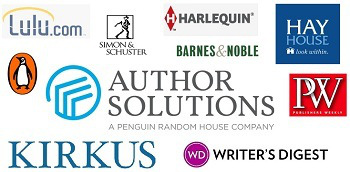 What do Simon & Schuster, Hay House, Barnes and Noble and Reader’s Digest have in common? Each of these reputable and famous names in publishing has forged a partnership with Author Solutions.
What do Simon & Schuster, Hay House, Barnes and Noble and Reader’s Digest have in common? Each of these reputable and famous names in publishing has forged a partnership with Author Solutions.
What is significant about that? Well…
In a detailed article written in April of 2015, author David Gaughran tells us why this is distressing news to authors.
The “Anti-Solution”
Far from providing solutions, Author Solutions operates “more like a telemarketing company whose customer base is the authors themselves,” write plaintiffs Wheeler and Heightsman as part of their 2015 class action law suit against the firm.
Some of Author Solutions’ long-standing issues faced by customers include:
- improperly reporting royalty information
- non-payment of royalties
- breach of contract
- predatory and harassing sales calls
- excessive markups on review and advertising services
- failure to deliver marketing services as promised
- telling customers their add-ons will only cost hundreds of dollars and then charging their credit cards thousands of dollars
- ignoring customer complaints
- shaming and banning customers who go public with their stories.
“Despite Author Solutions’ mounting legal troubles and an unending stream of complaints against the company from both its own customers and a whole host of writers’ organizers and campaigners, companies are still queuing up to partner with Author solutions,” writes Gaughran. Is it because its corporate parent is Penguin Random House?
Some “Partner Imprints” (in brackets) run by Author Solutions as a self-publishing service for the partner publishing house include:
- Simon & Schuster (Archway Publishing)
- Lulu
- Harlequin (DelleArte Press) – partnership terminated 2015
- Hay House (Balboa US, Balboa Australia)
- Barnes & Noble (Nook Press Author Services)
- Crossbooks (LifeWay) – partnership terminated 2014
- Penguin (Partridge India, Partridge Singapore, Partridge Africa)
- HarperCollins/Thomas Nelson/Zondervan (Westbow Press)
- Random House (MeGustaEscribir)
- Writer’s Digest (Abbott Press) – partnership terminated 2014
Many authors aren’t aware that these “Partner Imprints” are all run by the same company; or that Author Solutions’ own in-house imprints include iUniverse, Trafford, Palibrio, AuthorHouse, BookTango, and Xlibris.
According to Gaughran, this came about as a “solution” for traditional publishing houses to monetize their slush pile. That’s the pile of unsolicited works most beginning writers send to publishing houses that end up in a huge heap in some room that in the past was relegated to new underling editors to cut their teeth on. Now the manuscripts simply go to a company only interested in making money from writers willing to pay for their largely unedited works. Books that would never have been accepted by these traditional publishing houses are now finding a “home”. But what kind of “home” is it and what does the writer really achieve for her many dollars spent?
According to Gaughran’s sources at Penguin, the primary directive of Author Solutions is to sell (to the author) the most expensive publishing package they can and encourage authors to buy their own books. When depositions were made public, they revealed that two thirds of Author Solutions revenue comes from selling publishing and marketing packages and one third from selling books—with a vast majority of those book sales coming from authors buying their own books.
What about the cool opportunities for book signings at literary events, book displays, advertising space, TV and reviews that they promised? Gaughran provides a staggering list that includes Publishers Weekly, New York Times, Kirkus and the New York Review of Books, and my personal favorite Word on the Street Festival Toronto.
“These partnerships don’t provide any real value to Author Solutions customers,” says Gaughran. In an earlier class action lawsuit against Author Solutions by law firm Giskan Solotaroff Anderson & Stewart representing three authors, Publishers Weekly wrote:
The suit, which seeks class action status, alleges that Author Solutions misrepresents itself, luring authors in with claims that its books can compete with “traditional publishers,” offering “greater speed, higher royalties, and more control for its authors.” The company then profits from “fraudulent” practices, the complaint alleges, including “delaying publication, publishing manuscripts with errors to generate fees, and selling worthless services, or services that fail to accomplish what they promise.” The suit also alleges that Author Solutions fails to pay its authors the royalties they are due.
According to the law firm representing the authors:
“Author Solutions preys upon the dreams of authors by selling them expensive services that sound exciting but do not actually sell any books. Their defense: They aren’t being deceptive because they aren’t trying to sell books. Of course, for nearly 200,000 authors who have paid thousands (if not tens of thousands) of dollars to buy expensive services that promised to promote their books, Author Solutions’s indifference to book sales comes as more than a bit of a surprise.”
The Solution—But You May Not Like It…
So, what’s the solution? For those of you starting out, it’s important to know that firstly there are a lot of genuinely good publishing houses out there potentially interested in your book and willing to work with you in partnership toward a successful book that will sell.
The book publishing industry is booming in many different ways. And while the predatory arm of the mercenary would like to seduce you with glamour and unrealistic dreams—so long as you pay, a whole cadre of small presses are growing who are producing high quality works by emerging writers. These local Indie publishing houses are worth seeking out and submitting to.
But they don’t want to see your book until its ready. Reader ready. This puts the responsibility back on you, the writer, to produce the very best you can. I tell my writing students at the University of Toronto and George Brown College that if you want to publish, you need to:
- write the very best story you can
- get it edited, preferably by a professional editor or a writing coach of good repute
- research the book publishing market and submit to a traditional publisher (not a pretend-publisher who wants your money)
- rewrite (if you feel the need to) and resubmit to another publisher
- resubmit to another publisher
If you decide to self-publish, find a reputable printing house and learn what it takes to create a book. Find someone who does layout and covers professionally. There are good ones out there; I know—I use them myself. Learn some marketing skills or find a marketing specialist or PR specialist who has a sound track record and you can trust. The book industry was and still is based on sound relationships. Writers with editors; publishers with marketers and distributors; writers with readers; and so on. In the end, it’s up to you.
Take charge of your career and bring the “self” back into self-publishing.
Ed. Note: Link to the filing for the current lawsuit filed against Author Solutions. and a link to Writer Beware, a website that publishes information valuable to authors









